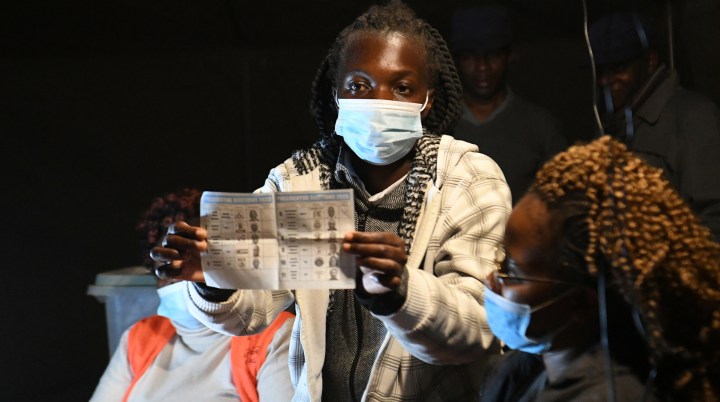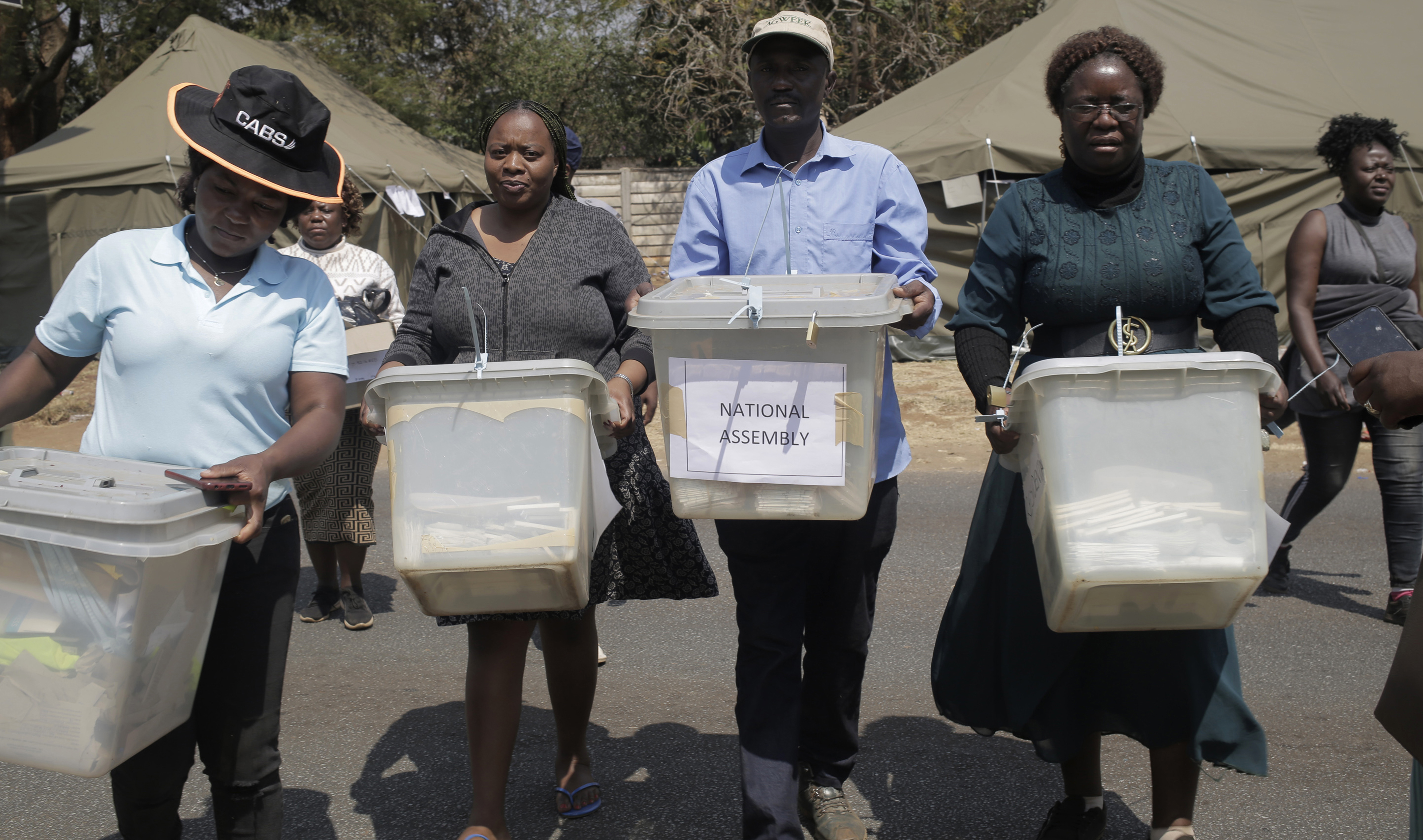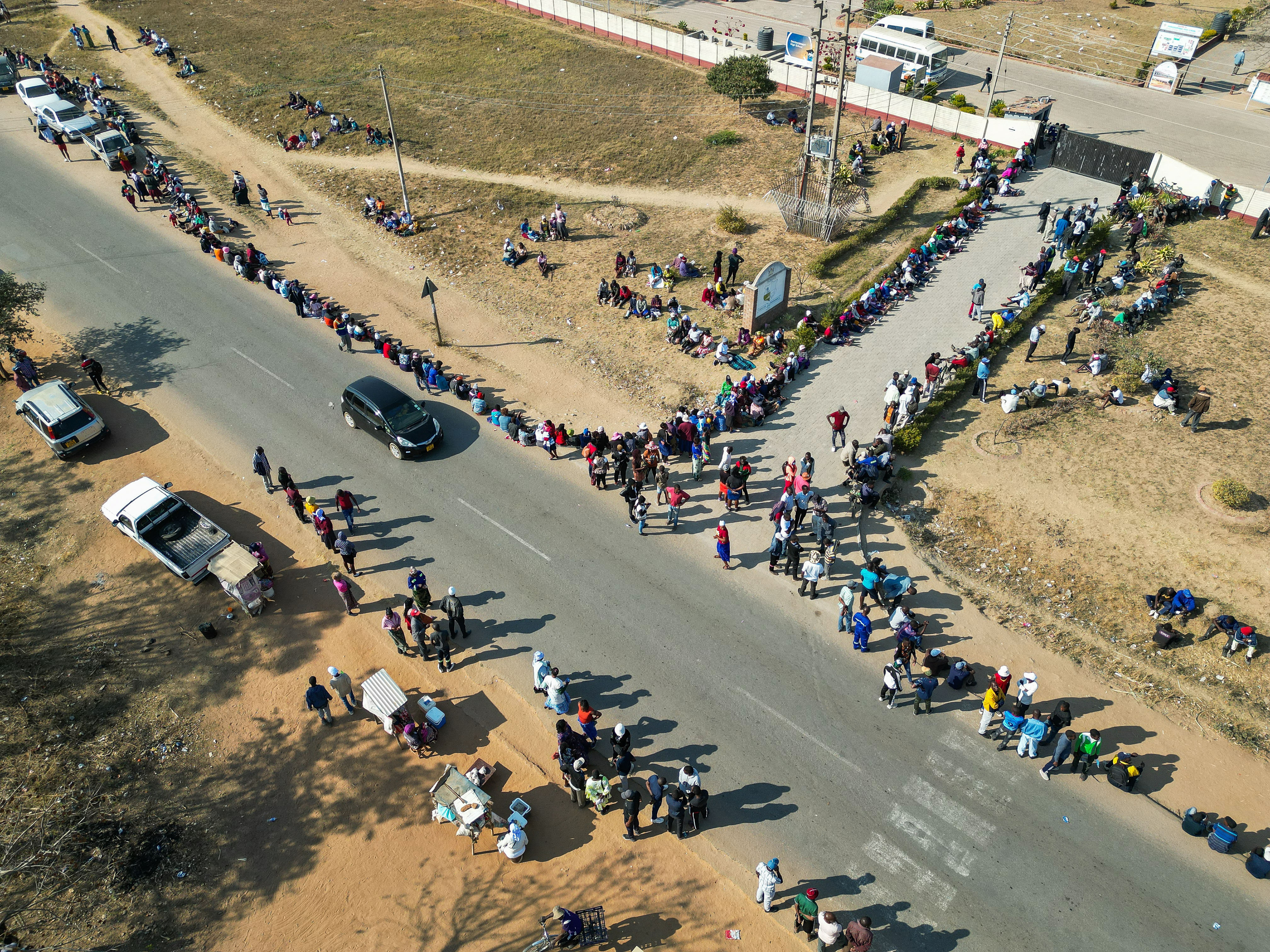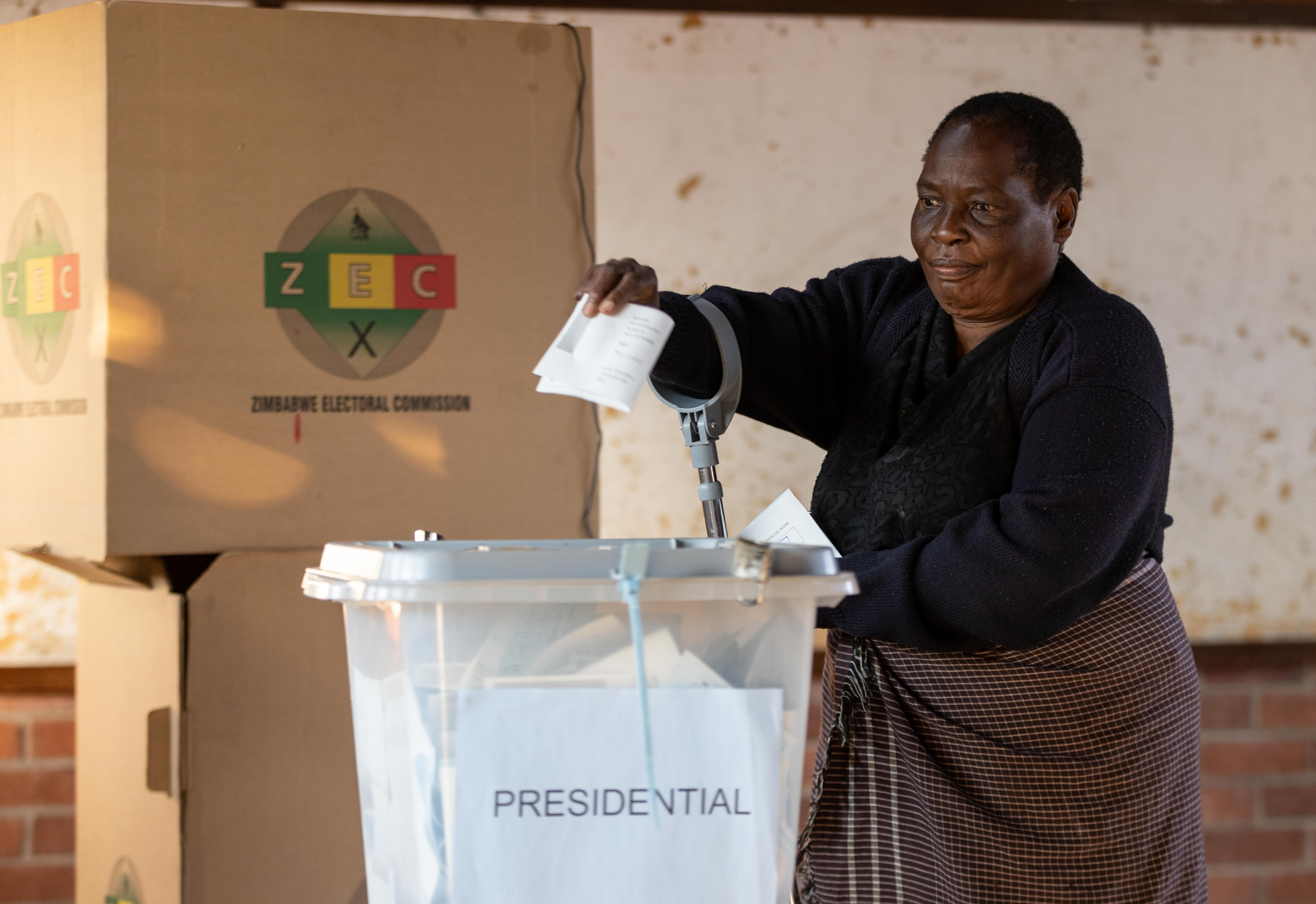
A Zimbabwe Electoral Commission official holds a ballot paper during the counting process at a polling station in Murewa on 24 August 2023. (Photo: EPA-EFE / Aaron Ufumeli)
Heavily armed Zimbabwean police details arrested 40 civil society activists on Wednesday night who were monitoring results coming from voting centres countrywide after Zimbabweans inconclusively cast their ballots in polls that have been described by the main opposition as “shambolic”.
Human rights lawyers expressed concern that the activists from the Zimbabwe Election Support Network (ZESN) and Election Resource Centre (ERC) were “being held incommunicado” after they were arrested by a police crack team on Wednesday night – making it difficult for their legal representatives to assist them.
Zimbabwe Lawyers for Human Rights (ZLHR) says it fears that the more time elapses without the lawyers having access to the activists, “this may turn out to be an enforced disappearance” as the country’s constitution places an obligation on law enforcement agents, particularly the police service, to respect the rights of arrested and detained persons.
The arrest of the officials is part of a deliberate ploy by the state to target civil society organisations and ultimately silence their voice on the 2023 elections.
“Muchadehama, Bamu and Ncube (their lawyers) are concerned that their clients are being illegally detained as law enforcement agents should first conduct investigations and effect any arrests after establishing a reasonable suspicion that an offence has been committed,” said ZLHR spokesperson Kumbirai Mafunda.
The Crisis in Zimbabwe Coalition (CiZC), comprising several NGOs operating in the troubled nation, said equipment belonging to the activists was also confiscated during the raid.

Zimbabwe Electoral Commission officials and polling agents carry ballot boxes from a polling station to a command centre in Harare on 24 August 2023. (Photo: EPA-EFE / Aaron Ufumeli)
“The heavily armed police crack team also confiscated all computers and other materials related to elections. ZESN is a registered organisation which was accredited to observe and monitor the August 23 elections in Zimbabwe. The arrest of the ZESN and ERC officials is part of a deliberate ploy by the state to target civil society organisations and ultimately silence their voice on the 2023 elections which has apparently failed to meet the credibility test,” it said.
The CiZC added that the arrests, coupled with many other electoral malpractices, put a dent on the credibility of the elections, and urged the Zimbabwean authorities to promote and protect the civil society space.
The coalition “implores the state to respect the Constitution and allow citizens to exercise their constitutionally guaranteed rights to vote, associate and speak without any threat. This night raid and detention of peaceful civil society actors makes Zimbabwe an outpost of tyranny. The state must desist from dictatorial tendencies and respect the pivotal role of civil society organisations in ensuring credible polls,” it added.
However, national police spokesperson, Assistant Commissioner Paul Nyathi, said the activists had been arrested for tabulating results on behalf of the opposition.
“They (the activists) were coordinating the alleged release of election results by some civic organisations linked to the Zimbabwe Election Support Network, Election Resource Centre and others,” said Nyathi.

Zimbabweans queue as they wait for ballot papers to reach their polling station in Epworth on 23 August 2023. (Photo: Tafadzwa Ufumeli / Getty Images)
The 40 civil rights activists join a long list of government critics arrested and charged for politically linked crimes.
Already, 40 opposition Citizens’ Coalition for Change activists, including an aspiring legislator, failed to vote after they were remanded in prison on allegations of holding an unsanctioned procession before Wednesday’s polls.
The arrest of election monitors comes after thousands of Zimbabweans who failed to vote on Wednesday owing to administrative bungling by the Zimbabwe Electoral Commission, which is overseeing the polls, were called back to cast their ballots.
Chaos on Wednesday
Zimbabweans voted on Wednesday to elect a new president as well as parliamentary and municipal representatives, but the process was chaotic, with many voters in several parts of the country failing to cast their votes while many had to do so by candlelight.
On Thursday, hundreds of prospective voters who missed out on voting on Wednesday could be seen queuing to cast their ballot with the polling station supposed to close by 7pm.
This followed an extension of the voting period by President Emmerson Mnangagwa on Wednesday evening to allow those who risked being disenfranchised, to exercise their right.
At some polling stations young voters braved the whole night to cast their votes, despite attempts by others to discourage them from doing so.
Analysts believe the chaos that characterised Wednesday’s vote was systematic and calculated to ensure that the opposition strongholds are disturbed.
“This is deliberate. It is calculated to discourage young voters from exercising their right to elect leaders of their choice. Let’s see the voter turnout – you will realise that it will be less than the 2018 statistics,” said analyst Rejoice Ngwenya.
The move by the police to arrest the civil rights groups puts a dent in the credibility of the process in a country where Zanu-PF has been in power for 43 years and previous elections have been marred by fraud and violence.
As Zimbabwe faces international isolation, Mnangagwa wanted to use the elections to win back international support, but the arrest of the activists and continued imprisonment of the CCC supporters raises the question of whether the Zanu-PF leader was serious with the re-engagement drive he had adopted.
“I don’t see the international community changing their stance against Zanu-PF, especially given how his administration has handled opponents such as Job Sikhala and the aspiring MP for Glenview South, along with his supporters. The move to arrest the civil society group makes it worse,” said international relations professor at Africa University, Alexander Rusero.
Mnangagwa (80) took over from longtime strongman Robert Mugabe when he was ousted in a military coup in 2017. Mnangagwa won a disputed election in 2018 and is seeking a second and last full term.
His re-election bid comes against a backdrop of economic misery, characterised with inflation, exchange rate volatility and high unemployment.

A woman casts her vote in Harare in the early hours of 24 August 2023. (Photo: Tafadzwa Ufumeli / Getty Images)
Young voters who braved the long night to cast their vote said they did so to create a future they can relate to.
“For us this is about our right. We must exercise it, and we have to. If it means us sleeping on the queue to cast our votes and have our voice heard, so be it,” said Brighton Goko, one of the first-time voters who cast his ballot at about 3am in Warren Park after endless delays.
After a significant number of polling stations in Harare and Bulawayo were hit by hours of delays on Wednesday, Mnangagwa ordered that voting should resume on Thursday in 40 wards.
Although the 40 wards make up less than 1% of the total, they include 11 in Harare, which has the highest number of registered voters and is a stronghold for the opposition.
‘Disaster’
A lecturer from the University of Zimbabwe and political analyst, Eldred Masunungure, said the whole process exposed the ZEC and its integrity was under spotlight.
“This is bad. ZEC has a lot of explanation to do. It suggests that the ZEC was far from prepared. In the affected wards, we witnessed what amounts to an institutional disaster,” he said.
Parliamentary results had been expected to trickle in on Thursday, with the presidential result coming later, though well before a five-day deadline. However, information filtering through suggests that CCC leader Nelson Chamisa’s party had taken an early lead against Mnangagwa’s Zanu-PF, mainly in urban areas traditionally controlled by the opposition and some few rural constituencies perceived to be Zanu-PF strongholds.
Under Zimbabwean law only the ZEC is mandated to announce the results of the elections. However, CCC spokesperson Promise Mkwananzi said his party was convinced that it would romp to an outright win despite polling being marred by irregularities.
“The Citizens Coalition for Change has long geared to win in spite of all the fraudulent electoral malpractices. We are ready to vote big, win big and defend big,” said Mkwananzi.
The opposition also accused the ZEC of allowing unregistered voters to cast their ballots during the extended period.
ZEC deputy chairperson Rodney Kiwa said his commission was not yet aware of those allegations. DM


